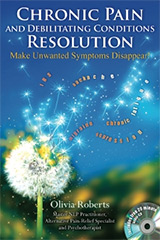Constipation is caused when the bowel refuses to let go of stools! The reasons for this are many, including your emotional state, drugs, and rarely, the food you eat. For some people, adding extra roughage can work, but if you have tried this and it didn’t work, you are ‘beyond’ roughage!
In this case, I don’t believe you should eat even more roughage when you are constipated, because if you cram more bran into the bowel, it will force itself into the spaces between the rings of muscle in the large bowel and form a big pouch – called a diverticulae. And there it will sit until your peristalsis gets moving again. I know – I used to eat bran continually when I was in my twenties, but it didn’t make me go to the loo! I just got wider and wider!
One day, adding a little roughage might not work, and then you can begin to change the way your bowel reacts to your feelings, using Resolution Magic, and then your bowel can keep on performing well.
Normal peristalsis
Peristalsis is the gentle squeezing movements that push the contents of the bowel onward. Different hormones are released when you relax, and when you work. They affect your intestines in different ways.
When you relax, peristalsis begins. While you put your feet up for a spell during the day, hormones are released that signals your intestines to begin work. All through the night, while you sleep, gentle rhythmic motions move food through your intestines.
When you are physically very active, other hormones cause peristalsis to slow down. While you are under stress, it can stop altogether.
Stress and constipation
Human Beings react with constipation whenever they are under stress. Some people get it whenever they stay away from home (that’s me too). Some people get it when they go into hospital for an operation – who wouldn’t be worried!
Many people get it as a result of taking medicines for pain relief, like codeine or morphine.
The Large Bowel
The large bowel is responsible for squeezing out the excess moisture and minerals from the contents of the bowel. It takes a long time to absorb the minerals that are required by the body, so there are times when it will normally hold on to the contents of the bowel for a number of days.
There are two influences that can result in constipation. The first one is hormonal, and the second one is electrical.
The hormone acetycholine causes peristalsis to slow down when you are very busy. If you are under a great deal of stress, the bowel can come to a standstill. This is one influence.
If the large bowel receives a little too much electricity (above a normal background electrical signal), it will do as any muscle would do, it contracts. When it receives even more electrical stimulus it squeezes harder. This is the second influence.
When the hormonal and/or the electrical influence stops, it takes a few days or even weeks for the large bowel to relax and let go of the stools. As it relaxes, the stools remain where they are to reconstitute with water before they are moved on to be emptied.
Just constipation
Because you are anxious, you may be sending electricity to your bowel that causes it to ‘hang on’ rather than relax and let go.
Most people are constipated when they go into hospital because they are quite naturally anxious about having tests or an operation. Quite often, elderly people are constipated when they have to leave their homes and go into a nursing home. Young children in foster care are often constipated because they are so stressed at the traumatic changes in their lives. Like many children, my first experience of constipation happened when I began to go to school. When these ‘new’ experiences become ‘normal’, the constipation doesn’t happen.
You can see that being constipated is a reaction to stress for many people – but not everyone!
SIRET Number 802 713 412 00012
disclaimer: results may vary. Please consult your GP – Resolution Magic can work along-side regular medicine.
Disclaimer: The book does not, and cannot, provide individual medical advice, but rather is for general informational purposes only. My advice is not intended to be a substitute for individualized medical advice, diagnosis or treatment by a qualified professional who is aware of your medical history and has had an opportunity to examine you.



